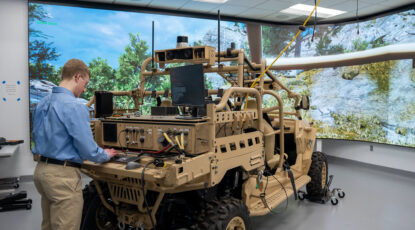Innovation
-
Off-road autonomy: U-M’s Automotive Research Center funded with $100 million through 2028
The U.S. Army has extended its long-running relationship with the U-M Automotive Research Center, reaching a new five-year agreement of up to $100 million to boost work on autonomous vehicle technologies. As automakers explore self-driving cars, the Army-funded center will figure out how to take the tech off-road.
-
These bubbles kill cancer
“Histotripsy” is a technique created by U-M engineers and doctors that harnesses soundwaves to attack cancer. It comes with the promise of few, if any side effects, a quick treatment time and, for patient Carrie Kumpel, the hope that it would completely destroy three spots that had formed on her liver.
-
Midlife blood test may predict cognitive decline, Alzheimer’s in later life
U-M researchers have connected two blood biomarkers to changes in cognitive function in women in midlife, opening a potentially powerful path to noninvasive, earlier detection and interventions for Alzheimer’s disease and other dementias.
-
AI in society: Perspectives from the field
Experts working in artificial intelligence, from technological to public policy roles, discuss the critical turning point we are experiencing in AI and what it means for the future
-
‘VR is not the next SmartPhone’
Jeremy Bailenson, BS ’94, served as one of the consultants on the $2.3-billion Sphere in Las Vegas, the groundbreaking immersive entertainment venue. Extended reality isn’t just for play, he says. Impactful learning experiences are among the technology’s most impressive benefits.
-
Hungry for more: Cancer, metabolism, and food
Metabolism pathways make tumors sensitive or resistant to treatments. A collaborative group of U-M scientists is leveraging these avenues to explore the growing foundation of new potential therapies.
-
Mood Lifters: Think of it like ‘Weight Watchers’ for mental health
This proven and peer-led mental wellness program, created by a U-M scientist (and WW success story), seeks to help people who shun or can’t afford traditional therapy. Like the popular weight-loss program, it’s community-based, inexpensive, and — best of all — scaling up.
-
Tumor-destroying sound waves receive FDA approval for liver treatment in humans
Technique developed at U-M provides a noninvasive alternative to surgery, chemotherapy, and radiation treatments for cancer. A human trial underway since 2021 at the Rogel Cancer Center and other locations demonstrates the technology’s ability to meet the testing’s primary effectiveness and safety targets.
-
Are you there, AI? It’s me, God
As artificial intelligence apps such as ChatGPT have proliferated, so have chatbots with a religious bent. In this video and Q&A, Webb Keane, U-M professor of anthropology, shares his thoughts about so-called “godbots,” and the danger of giving moral authority to artificial intelligence.










